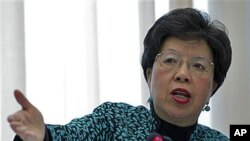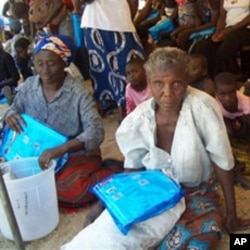World Health Organization Director-General Margaret Chan is praising a number of, what she calls, public health triumphs. Dr. Chan’s remarks were made at the opening of the annual WHO Executive Board meeting.
World Health Organization Chief, Margaret Chan, is upbeat about the future of public health. She detailed recent life-saving ventures for the 34-member WHO Executive Board.
She says one of the most exciting achievements is a new meningitis vaccine that has the potential to end devastating epidemics in Africa’s meningitis belt.
She notes no large pharmaceutical company was interested in developing the vaccine because it would not result in big profits. So, she says a consortium of academics and scientists, with core funding from the Bill and Melinda Gates Foundation, developed the vaccine.
She says African scientists contributed to the design of study protocols and conducted the clinical trials.
“The vaccine was developed, from start to finish, in less than a decade, in record time, and at about one-tenth of the cost usually needed to bring a product through development to the market," said Chan. "African countries frequently have to wait for years, if not decades, for new medical products to trickle into their health systems. Not this time. For once, the best technology that the world, working together, can offer is being introduced in Africa.”
The first country wide vaccination campaign took place in Burkina Faso in December. This is being followed by similar campaigns in Mali and Niger. While this is seen as a great triumph, Dr. Chan notes there are 25 countries in the Meningitis belt, many of whom will not be able to mount vaccination campaigns for lack of funds.
She says public health is on a winning streak. But, Dr. Chan warns a shortage of money could stall progress in other promising undertakings, such as vaccines for preventing diarrhoeal disease and pneumonia and the new diagnostic test for tuberculosis.
“Treated bed nets need to be replaced. Antiretroviral therapy for AIDS is a lifeline, for a lifetime," she said. "Case finding and treatment for tuberculosis are a constant undertaking that needs to intensify. Every new generation of babies must be protected from vaccine-preventable diseases. Last year, we launched an aggressive new strategy for polio eradication. Does the international community have the stamina, and the resources, to reach the milestones?”
The WHO chief says she hopes the effort to eradicate guinea worm will continue and not be stymied by lack of money. She notes significant progress is being made in treating neglected-tropical diseases that claim thousands of lives in Africa each year.
She urges the 34-member board to think carefully about how to maintain the public health momentum and how to turn less successful ventures into winning strategies.
During the course of this week, the board will examine many health issues, including the H1N1 pandemic, smallpox eradication and ways to control and prevent cholera. It will make decisions to advise and facilitate the work of the World Health Organization and prepare the agenda for the next Health Assembly in May.





